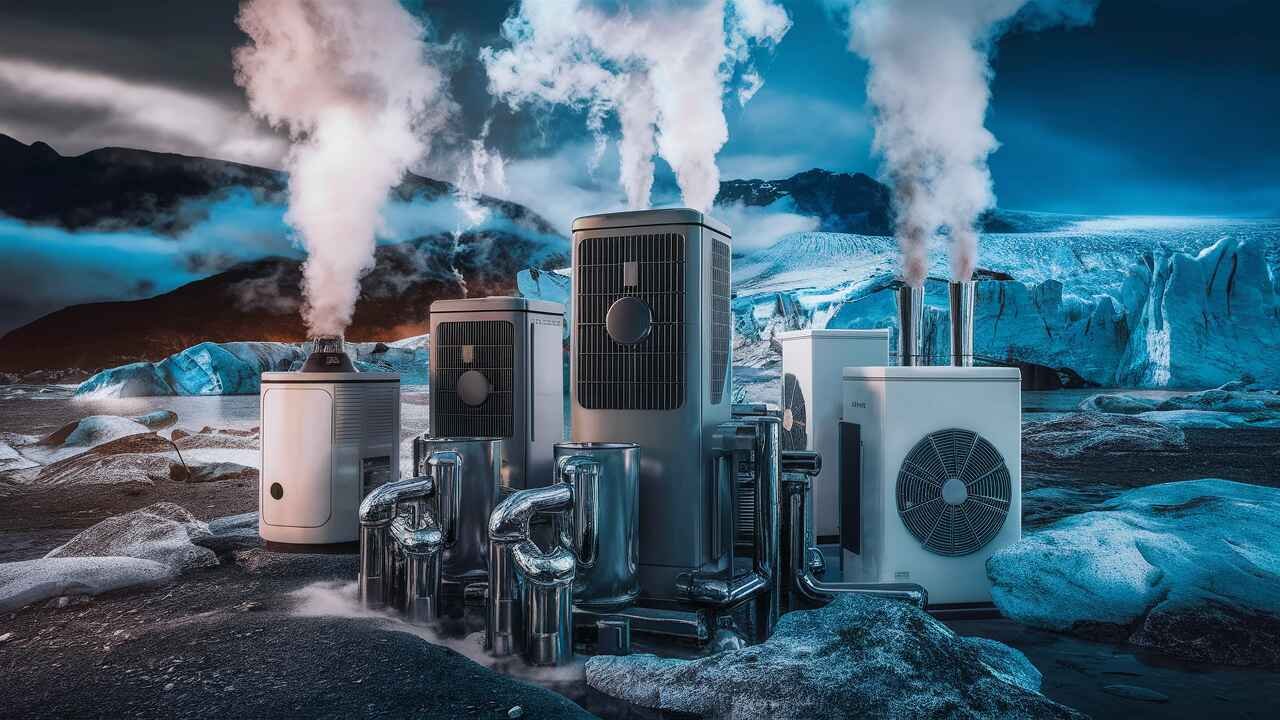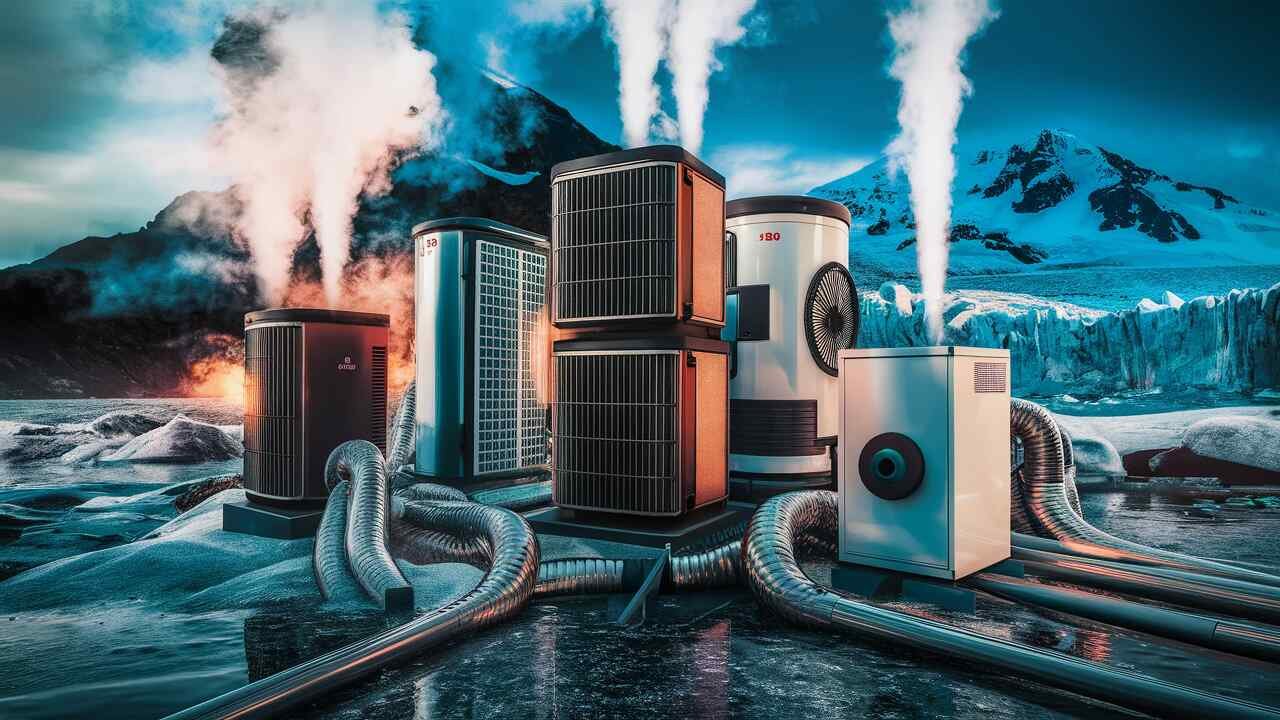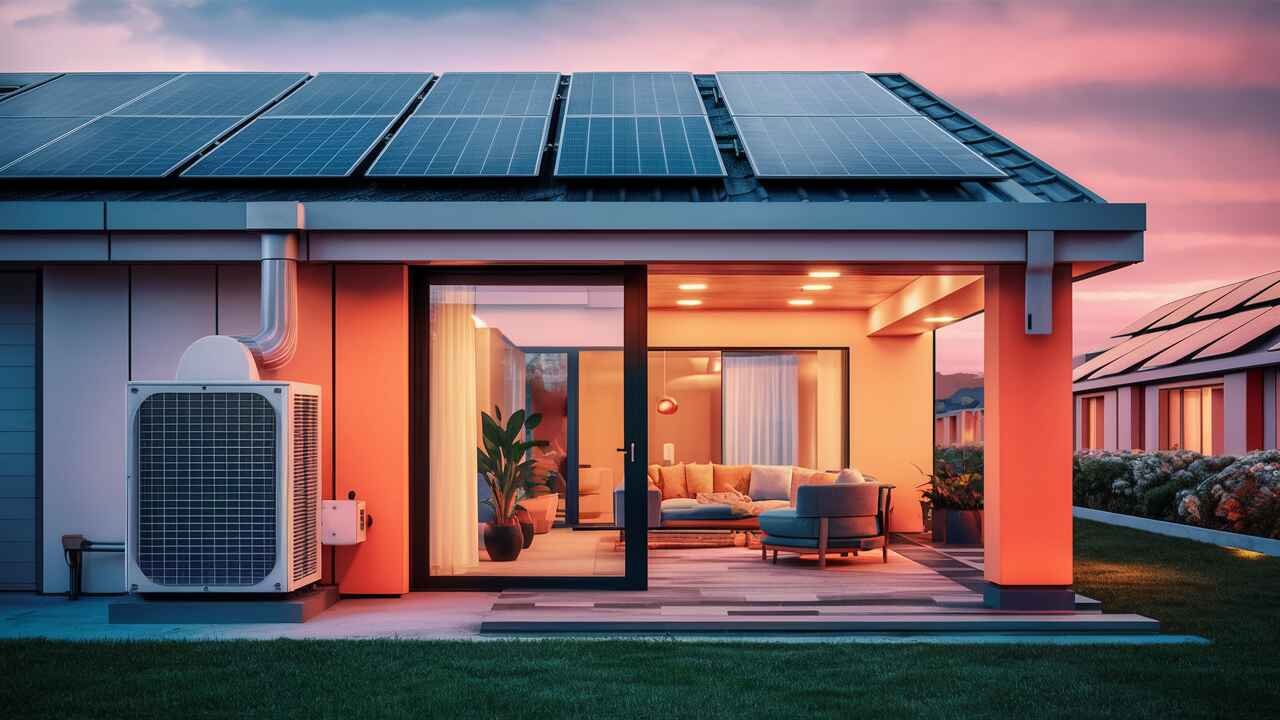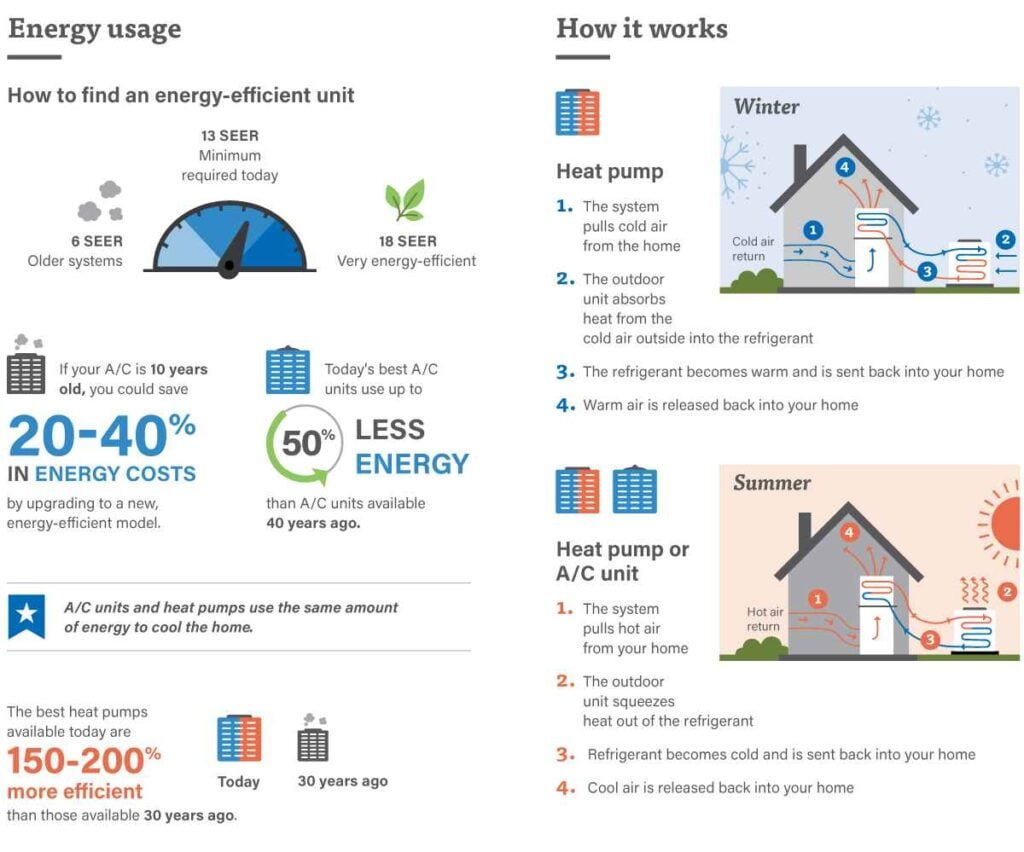Are you considering upgrading your home’s heating system but can’t decide between a heat pump vs furnace? Understanding the key differences between these two popular options is crucial to making an informed decision. In this comprehensive guide, we’ll dive deep into the world of heat pumps and furnaces, exploring their functionality, efficiency, costs, and more.
What Are the Key Differences Between a Heat Pump vs Furnace?
Diving into the heat pump vs furnace debate, it’s kinda cool how they both aim to keep your place cozy but in super different ways. A gas furnace, which could be an oil furnace or a natural gas furnace, heats up your indoor air by burning fuel to produce hot air. This old-school method can either make use of a high efficiency natural gas furnace or stick to the traditional types, but in any case, gas furnaces may not be as efficient as a furnace that uses modern tech.
Now, flipping over to the heat pump side, specifically stuff like the mini-split heat pump or a ground-source heat pump, these gadgets are kinda like the Swiss Army knife in your HVAC system. They’re slick because they can snag heat from the air or even tap into geothermal heat to heat a home. And here’s the kicker: heat pumps tend to be generally more efficient than gas furnaces since they’re just moving heat around, not creating it by burning something. So, when tossing up the idea of whether to replace a gas furnace with a new heat pump, remember that a heat pump versus furnace situation usually ends with the heat pump being the more efficient way to heat a home.
When it comes to heating your home, heat pumps and furnaces take different approaches. Let’s break down the fundamental distinctions between these two systems.
Heat Pump vs Furnace: Understanding How They Generate Heat
A gas furnace burns natural gas to generate heat, which is then distributed throughout your home via ductwork. In contrast, a heat pump uses electricity to move heat from one place to another, either from the outside air, ground, or water source into your home.
Electric Furnace vs Heat Pump: A Comparison of Energy Use
Electric furnaces use electricity to heat air, which is then circulated through your home. Heat pumps, on the other hand, use electricity more efficiently by moving heat rather than generating it directly. This makes heat pumps generally more energy-efficient than electric furnaces.
Assessing the Impact of Climate on the Efficiency of Heat Pumps and Furnaces

The efficiency of heat pumps and furnaces can vary depending on your local climate. Heat pumps work best in moderate climates, while furnaces are better suited for colder regions. However, advances in heat pump technology have made them viable options even in colder areas.
How Do Heat Pumps Function Compared to Furnaces?
Diving into the heat pump vs furnace debate? It’s all about where you get your cozy from. While both can rock the heating and cooling system stage in your home, heat pumps are like the cool kids that pull heat from the air or ground to warm you up or cool you down. They’re slick, especially because a heat pump is more efficient than using something like a traditional furnace. But hey, furnaces have their charm by generating their own heat to keep you toasty.
Now, if we’re talking types, air source heat pumps are pretty common because they’re great at moving heat around, but geothermal heat pumps take it up a notch by grabbing that heat from the ground. Sure, efficient gas furnaces that use natural gas can be cozy and warm, and natural gas is cheaper than gas and oil, but when you compare the amount of heat produced and the overall system efficiency, the heat pump is usually the star. Plus, heat pump maintenance is pretty straightforward, though don’t forget that furnace maintenance is a thing too.
But here’s the kicker, for those colder nights when just one system might not cut it, you can pair a heat pump with gas furnace to create a hybrid system that’s ready to roll no matter what Mother Nature throws at you. This combo means you can still enjoy the efficiency of a heat pump when the weather’s mild and switch to the powerful heat source of a furnace when it’s freezing. Considering certain heat pumps can also cool your space, choosing between a heat pump or a furnace really comes down to your specific needs and how you want to tackle that amount of heat challenge.
To make an informed decision, it’s essential to understand how heat pumps and furnaces operate. Let’s take a closer look at their inner workings.
Exploring Air-Source Heat Pump and How It Extracts Heat from Outside
An air-source heat pump, the most common type of heat pump, extracts heat from the outside air and transfers it inside to heat your home. During summer, the process is reversed, and the heat pump moves heat from inside your home to the outside, acting as an air conditioner.
Gas Furnace vs Electric Heat Pump: Diving Into Their Heating Processes

A gas furnace burns natural gas in a combustion chamber, and the resulting heat is transferred to air via a heat exchanger. The heated air is then distributed throughout your home using a blower and ductwork. An electric heat pump, however, uses refrigerant to absorb heat from one place and release it in another, efficiently moving heat rather than creating it.
The Role of Air Conditioning in Heat Pump Systems Versus Furnaces
One significant advantage of heat pumps is that they can both heat and cool your home. In contrast, furnaces only provide heat, requiring a separate air conditioning system for cooling during summer months.
Examining the Installation Costs and Long-term Savings of Heat Pumps and Furnaces
When thinking about upgrading the system in your home, it’s crucial to weigh up the differences between heat pumps and furnaces. Sure, a furnace installation might seem cheaper upfront, but a heat pump is an energy-efficient beast that can both heat or cool your place. Unlike furnaces generate heat, a heat pump moves air, making it way more efficient than a furnace.
While the furnace is usually paired with the fact it furnace creates a cozy vibe fast, the heat pump is the most common choice for folks looking at long-term savings. Sure, heat pumps need a bit of backup heat when it’s super chilly, but if you pair a gas furnace with an air-to-air heat pump, you’ve got a solid game plan for all seasons without burning through cash.
Cost is a crucial factor when choosing between a gas furnace vs heat pump. Let’s examine the upfront installation costs and potential long-term savings of each system.
Initial Installation Cost: Heat Pump vs Furnace
The upfront cost of installing a heat pump is generally higher than that of a furnace, especially if you’re replacing an existing furnace. However, the cost difference can be offset by long-term energy savings and the fact that a heat pump also provides cooling.
Efficient Than Gas Furnaces: Do Heat Pumps Save More in the Long Run?

Heat pumps are typically more energy-efficient than gas furnaces, which can lead to significant savings on your energy bills over time. The exact savings will depend on factors such as your local climate, energy prices, and the efficiency of your specific heat pump model.
When it comes to warming up your place, you’ve got options like heat pumps and furnaces. Heat pumps are awesome for both heating and cooling, and they’re energy efficient, which means less guilt about your carbon footprint. Furnaces, on the other hand, are great at cranking out heat fast and are perfect for those super chilly nights. But, while heat pumps are gentle on the bills and good for the planet, they might not cut it in freezing temps. And a furnace? Also a solid choice, but get ready for higher utility bills and more emissions.
Considering the Cost of Gas Lines Installation for Gas Furnaces
If your home doesn’t have existing gas lines, installing a gas furnace can be more expensive due to the added cost of running new gas lines. This is an important consideration when comparing the overall installation costs of heat pumps and gas furnaces.
Pros and Cons of Heat Pumps and Furnaces for Your Home Heating Needs
Both heat pumps and furnaces have their advantages and disadvantages. Let’s explore the pros and cons of each system to help you make an informed decision.
Heat Pump System: Weighing the Benefits and Drawbacks
Pros:
- Energy-efficient, especially in moderate climates
- Provides both heating and cooling
- Can be powered by renewable energy sources
Cons:
- Higher upfront installation costs
- May require supplemental heating in extremely cold temperatures
- Requires more maintenance than furnaces
Gas Furnace: A Closer Look at its Advantages and Limitations
Pros:
- Lower upfront installation costs compared to heat pumps
- Provides powerful heating, even in very cold climates
- Generally requires less maintenance than heat pumps
Cons:
- Less energy-efficient than heat pumps
- Relies on fossil fuels, contributing to greenhouse gas emissions
- Requires a separate air conditioning system for cooling
Electric Heat Pump vs Gas Heating: Which is More Efficient?
In terms of energy efficiency, electric heat pumps typically outperform gas furnaces. Heat pumps can provide up to three times more heat energy than the electrical energy they consume. However, the efficiency of heat pumps can decrease in extremely cold temperatures, while gas furnaces maintain their efficiency regardless of outdoor temperatures.
Deciding Which Heating System is Right for Your Home
Choosing between a heat pump vs furnace depends on several factors specific to your home and location. Consider the following aspects when making your decision:
Climate Considerations: Heat Pump or Furnace?
If you live in a moderate climate, a heat pump is likely the most efficient option. However, if your area experiences prolonged periods of sub-freezing temperatures, a furnace may be a better choice. Some homeowners in colder climates opt for a hybrid system that combines a heat pump with a gas furnace for optimal comfort and efficiency.
Analyzing Your Home’s Heating Needs: Heat Pump vs Furnace
Consider your home’s size, layout, and insulation when choosing between a heat pump vs furnace. A well-insulated home may be better suited for a heat pump, while a larger or older home may benefit from the powerful heating capabilities of a furnace.
Installation and Long-Term Costs: What to Expect

While heat pumps generally have higher upfront installation costs, they can provide significant long-term energy savings. On the other hand, furnaces have lower initial costs but may lead to higher energy bills over time. Consider your budget and long-term goals when weighing the costs of each system.
FAQs: Addressing Common Questions About Heat Pumps and Furnaces
To help you make an informed decision, let’s address some frequently asked questions about heat pump vs furnace.
Can Heat Pumps Provide Enough Heat in Colder Climates?
Modern heat pumps are designed to operate efficiently in colder climates, with some models capable of providing heat even when outdoor temperatures drop below freezing. However, in extremely cold regions, a heat pump may require supplemental heating from electric resistance strips or a gas furnace.
Is a Gas Furnace More Reliable Than a Heat Pump?
Both gas furnaces and heat pumps are reliable heating systems when properly maintained. However, gas furnaces typically require less maintenance than heat pumps, which have more moving parts and require regular servicing of both indoor and outdoor units.
Heat Pump vs Furnace: Which System is More Environmentally Friendly?
Heat pumps are generally considered more environmentally friendly than gas furnaces because they don’t rely on fossil fuels and can be powered by renewable energy sources. Additionally, heat pumps don’t produce greenhouse gas emissions directly, while gas furnaces release carbon dioxide and other pollutants during combustion.
Is a heat pump better than a furnace?
The answer depends on your specific needs and location. Heat pumps are more energy-efficient and provide both heating and cooling, making them a better choice for moderate climates. However, furnaces are better suited for colder regions and homes without access to natural gas.
What is the downside to a heat pump?
The main drawbacks of heat pumps include higher upfront installation costs, reduced efficiency in extremely cold temperatures, and the need for more frequent maintenance compared to furnaces.
Is it cheaper to run a heat pump or gas furnace?
In most cases, heat pumps are cheaper to operate than gas furnaces due to their higher energy efficiency. However, the actual cost savings will depend on factors such as your local climate, energy prices, and the efficiency of your specific heat pump or furnace model.
Should I switch from a furnace to a heat pump?
Switching from a furnace to a heat pump can be a smart choice if you live in a moderate climate and want to take advantage of the energy efficiency and cooling capabilities of a heat pump. However, if you live in a very cold region or don’t have access to natural gas, sticking with a furnace may be the better option.
In conclusion, choosing between a heat pump and a furnace requires careful consideration of your home’s specific needs, local climate, and long-term goals. By understanding the key differences between these two heating systems and weighing their pros and cons, you can make an informed decision that will keep your home comfortable and energy-efficient for years to come.


